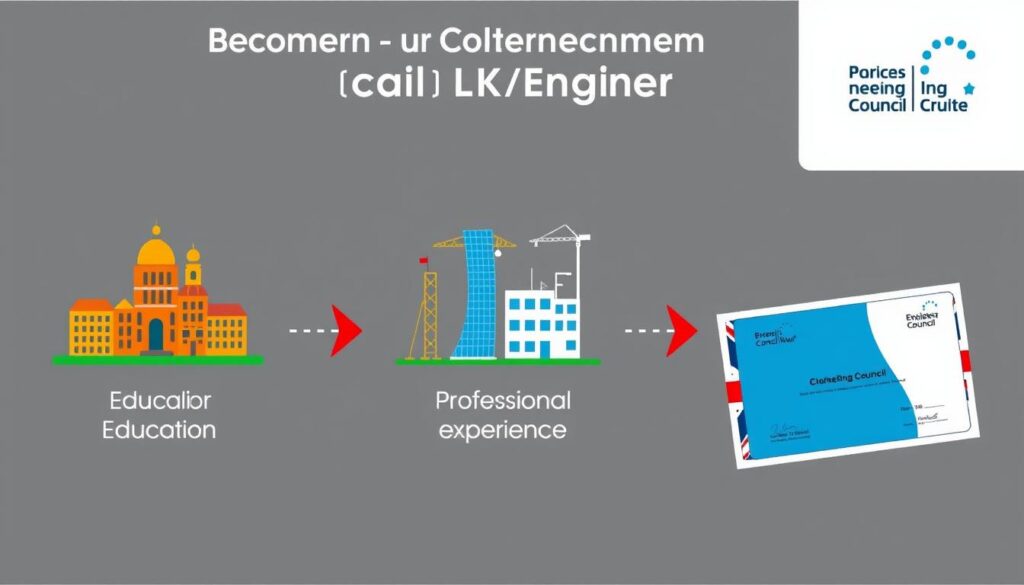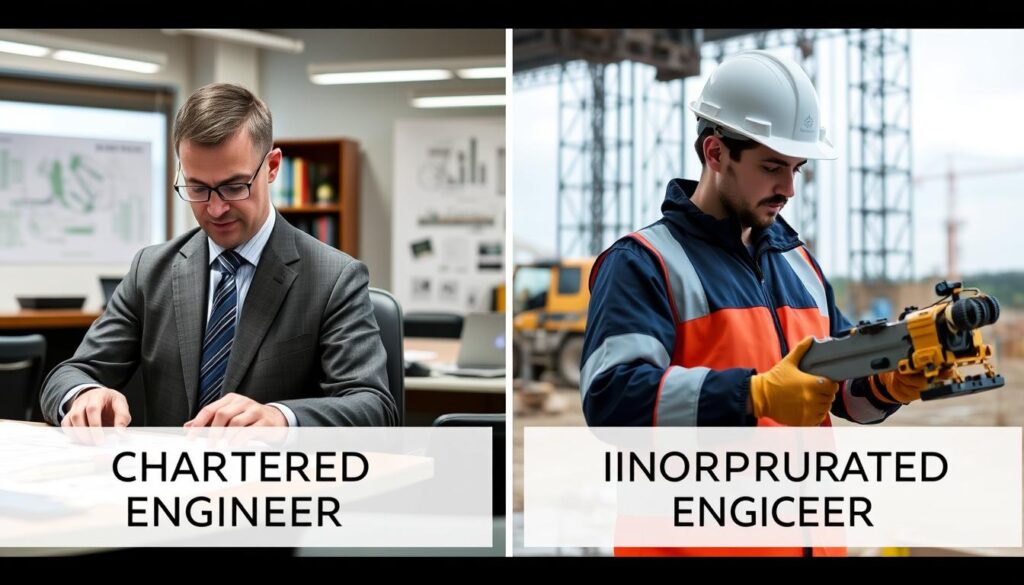Achieving chartered civil engineer status in the UK represents a significant milestone in your engineering career. This professional qualification demonstrates your expertise, commitment to ethical standards, and ability to solve complex engineering problems. Our comprehensive guide walks you through each step of this rewarding journey, from educational requirements to professional registration and beyond.
Benefits of Becoming a Chartered Civil Engineer
Earning the prestigious Chartered Engineer (CEng) designation through institutions like the Institution of Civil Engineers (ICE) offers numerous advantages that can transform your career trajectory.
Chartered status opens doors to senior roles and increased responsibilities
Professional Recognition
- Internationally recognized qualification demonstrating your expertise
- Distinguished “CEng” designation after your name
- Verification of your competence by respected engineering institutions
- Enhanced credibility with clients, employers, and colleagues
Career Advancement
- Access to senior engineering and management positions
- Significantly improved salary prospects (average £52,000+)
- Greater job security and employability
- Opportunities to work on high-profile infrastructure projects
Ready to advance your engineering career?
Take the first step toward chartered status by exploring accredited engineering programs that meet Engineering Council requirements.
Step-by-Step Pathway to Chartered Status
The journey to becoming a chartered civil engineer in the UK follows a structured pathway that combines academic qualifications, professional experience, and formal assessment. Understanding each stage will help you plan your career development effectively.

-
Educational Requirements
The first step is obtaining the necessary academic qualifications. You’ll need:
- An accredited 4-year integrated MEng degree, OR
- An accredited Bachelor’s degree in civil engineering plus an accredited Master’s degree
- Degrees must be recognized by the Engineering Council through accreditation
The best universities for civil engineering in the UK include Imperial College London, University of Cambridge, University of Oxford, and University of Southampton, all offering fully accredited programs.
-
Initial Professional Development (IPD)
After completing your education, you’ll need to gain relevant professional experience:
- Typically 4-5 years of progressive responsibility in civil engineering
- Experience must cover the competencies outlined in UK-SPEC (UK Standard for Professional Engineering Competence)
- Development can be supported through structured graduate schemes or mentored roles
Civil engineering apprenticeships in London and other major cities provide an alternative route to gaining this experience while studying part-time.
-
Professional Institution Membership
Join a relevant professional institution that can award CEng status:
- Institution of Civil Engineers (ICE) – most common for civil engineers
- Chartered Institution of Highways & Transportation (CIHT)
- Institution of Structural Engineers (IStructE)
Each institution offers support, resources, and networking opportunities to help you through the registration process.
-
Professional Review
The final assessment stage includes:
- Submission of a detailed portfolio of evidence demonstrating your competencies
- Professional Review Report documenting your experience and achievements
- Professional Review Interview with experienced chartered engineers
- Possible technical presentation or written examination (institution-dependent)
Ready to begin your chartered journey?
Take the first step by completing an initial assessment with your chosen professional institution.
Key Competencies for Chartered Status
To achieve chartered status, you must demonstrate specific competencies as defined by the Engineering Council’s UK-SPEC framework. These competencies are assessed during your professional review.

| Competence Area | Description | Example Evidence |
| A: Knowledge and Understanding | Maintain and extend knowledge of engineering principles, methodologies, and new developments | Design calculations, technical reports, continuing professional development records |
| B: Design, Development and Problem Solving | Apply appropriate theoretical and practical methods to design, develop, and solve engineering problems | Project case studies, design innovations, technical solutions to complex problems |
| C: Responsibility, Management and Leadership | Demonstrate technical and commercial leadership, manage projects and teams | Project management documentation, team leadership examples, budget responsibility |
| D: Communication and Interpersonal Skills | Communicate effectively with technical and non-technical audiences | Presentations, reports, client communications, stakeholder engagement |
| E: Professional Commitment | Demonstrate commitment to professional ethics, sustainable development, and safety | Ethical decision-making examples, sustainability initiatives, safety improvements |
Master the competencies required for chartered status
Download our comprehensive competence framework guide to help structure your professional development.
Understanding the Difference: CEng vs. IEng
When pursuing professional registration in UK engineering, it’s important to understand the difference between IEng and CEng qualifications to choose the path that best aligns with your career goals.

Chartered Engineer (CEng)
- Develop solutions to complex engineering problems using new or existing technologies
- Demonstrate innovation, creativity, and technical analysis
- Requires MEng degree or BEng plus Master’s (or equivalent)
- Typically needs 4-8 years of professional experience
- Focus on developing new solutions and technologies
- Higher average salary (£45,000-£62,000+)
- Strategic leadership and management responsibilities
Incorporated Engineer (IEng)
- Maintain, manage, and apply current technology to solve engineering problems
- Focus on application rather than development of new technologies
- Requires accredited Bachelor’s degree (or equivalent)
- Typically needs 3-5 years of professional experience
- Emphasis on practical application and implementation
- Lower average salary (£35,000-£45,000)
- Operational management responsibilities
Both qualifications are highly respected and recognized by the Engineering Council. Your choice should depend on your career aspirations, educational background, and the nature of work you enjoy. Many engineers start with IEng and later progress to CEng as their career develops.
Not sure which qualification is right for you?
Speak with a professional advisor from the Engineering Council to discuss your specific situation and career goals.
Alternative Routes to Chartered Status
While the standard pathway involves accredited degrees and traditional work experience, there are alternative routes to becoming a chartered civil engineer in the UK that may better suit your circumstances.

Technical Report Route
For engineers without accredited degrees, the Technical Report Route allows you to demonstrate equivalent knowledge:
- Submit a detailed technical report demonstrating Master’s-level knowledge
- Undergo assessment interview on technical content
- May require additional reading or study to fill knowledge gaps
- Once passed, proceed to standard Professional Review
Apprenticeship Route
Engineering apprenticeship schemes in the UK provide an earn-while-you-learn pathway:
- Degree apprenticeships combine work and part-time study
- Gain relevant experience while earning accredited qualifications
- Typically takes 5-6 years to complete
- Employers often cover education costs
Experiential Learning
For highly experienced engineers without formal qualifications:
- Demonstrate equivalent learning through extensive experience
- Submit detailed portfolio showing knowledge acquisition
- Undergo rigorous assessment of competence
- May require 10+ years of relevant experience
International Routes
For engineers qualified outside the UK:
- Washington Accord signatories have mutual recognition of qualifications
- EU qualifications may be recognized through EUR-ACE framework
- International Professional Engineers Agreement (IPEA) provides routes for registered engineers
- May require additional UK-specific assessment
Explore apprenticeship opportunities
Discover civil engineering apprenticeships that combine work experience with study toward chartered status.
Career Landscape for Chartered Civil Engineers
Understanding the current career landscape helps you make informed decisions about pursuing chartered status and planning your professional development.

Salary Expectations
Chartered civil engineers enjoy competitive compensation that reflects their expertise and responsibility:
| Career Stage | Civil Engineering (CEng) | Mechanical Engineering (CEng) | Electrical Engineering (CEng) |
| Newly Chartered | £45,000 – £50,000 | £45,000 – £52,000 | £47,000 – £53,000 |
| Mid-Career (5-10 years post-CEng) | £55,000 – £65,000 | £58,000 – £68,000 | £60,000 – £70,000 |
| Senior (10+ years post-CEng) | £65,000 – £85,000+ | £68,000 – £90,000+ | £70,000 – £95,000+ |
| Director/Principal Level | £80,000 – £120,000+ | £85,000 – £125,000+ | £90,000 – £130,000+ |
Market Demand and Opportunities
Several factors are shaping the demand for chartered civil engineers in the UK:
UK Government Infrastructure Projects
Major initiatives creating opportunities include:
- National Infrastructure Strategy (£600 billion investment)
- HS2 high-speed rail network
- Road investment strategy
- Flood defense programs
- Net zero carbon infrastructure transformation
Impact of External Factors
Understanding how external factors affect the profession:
- Brexit effects: Increased demand for UK-qualified engineers as EU mobility changes
- Sustainability focus driving new specializations
- Digital transformation creating tech-focused roles
- Skills shortage increasing value of chartered status

Major infrastructure projects like HS2 are creating significant demand for chartered civil engineers
Top Employers
Leading organizations actively recruiting chartered civil engineers include:
Consultancies
- Arup
- Atkins
- Mott MacDonald
- WSP
- Jacobs
Contractors
- Balfour Beatty
- Kier Group
- Laing O’Rourke
- Skanska UK
- Costain
Public Sector
- Highways England
- Network Rail
- Environment Agency
- Local authorities
- HS2 Ltd
Explore career opportunities
Discover current openings for chartered civil engineers and those on the pathway to chartered status.
Maintaining Chartered Status
Achieving chartered status is not the end of your professional journey. To maintain your CEng designation, you must demonstrate ongoing commitment to professional development.

Continuing Professional Development (CPD)
CPD is a structured approach to maintaining and enhancing your knowledge and skills:
- Most institutions require 30+ hours of CPD activities annually
- Activities must be recorded and may be audited
- Should cover technical knowledge, management skills, and professional conduct
- Can include formal courses, conferences, self-directed learning, and on-the-job development
Professional Engagement
Active participation in the engineering community helps maintain your professional edge:
- Membership in relevant technical societies and committees
- Mentoring early-career engineers
- Contributing to industry publications and research
- Participating in institution activities and events
Structure your professional development
Access CPD planning tools and resources to maintain your chartered status effectively.
Begin Your Journey to Chartered Status
Becoming a chartered civil engineer in the UK is a challenging but rewarding journey that opens doors to enhanced career opportunities, professional recognition, and higher earning potential. The process requires dedication to both academic excellence and practical skill development, but the benefits make it well worth the effort.

Whether you’re just starting your engineering education, currently gaining experience, or preparing for your professional review, understanding the pathway and requirements will help you navigate the process effectively. Remember that professional institutions like ICE, CIHT, and others offer valuable support and resources throughout your journey.
Ready to begin your chartered journey?
Take the first step today by connecting with a professional institution that can guide you through the process.

Pingback: Certified Civil Engineering: Global Standards and Credentials